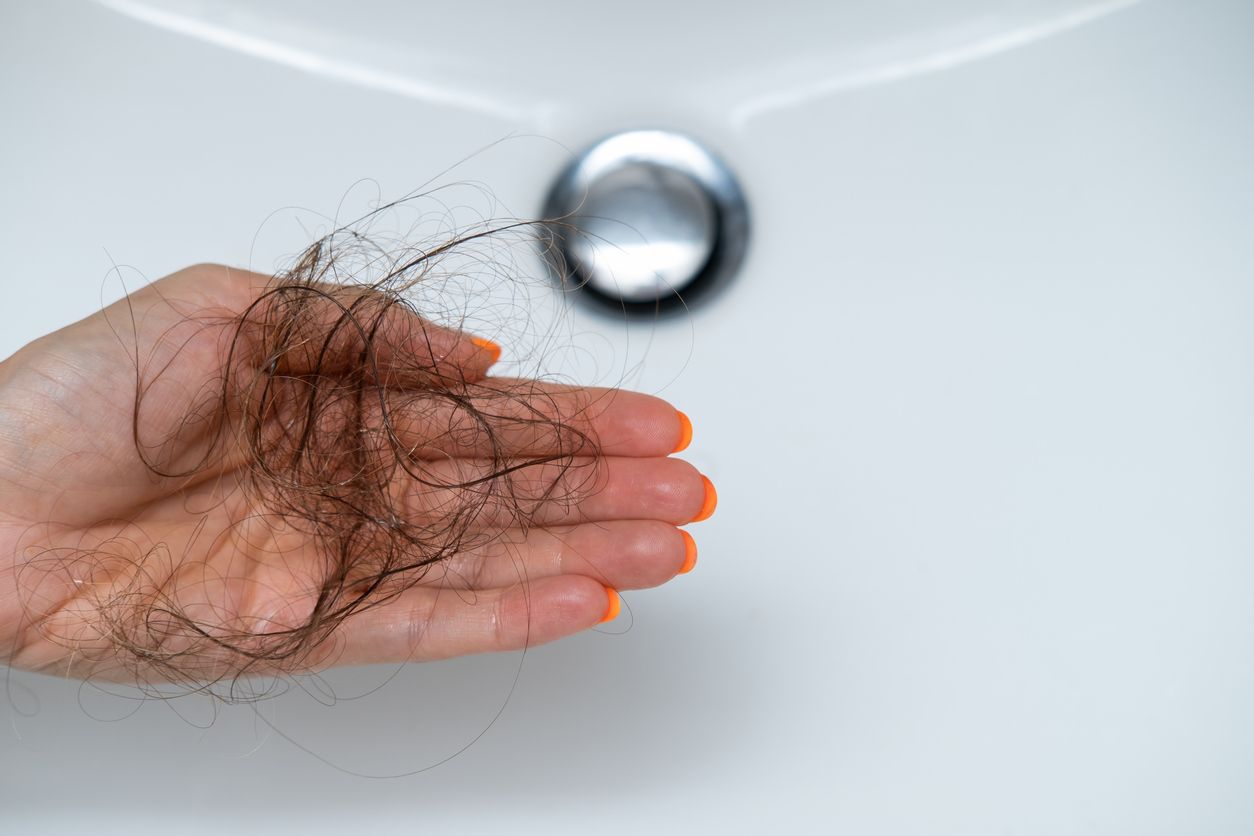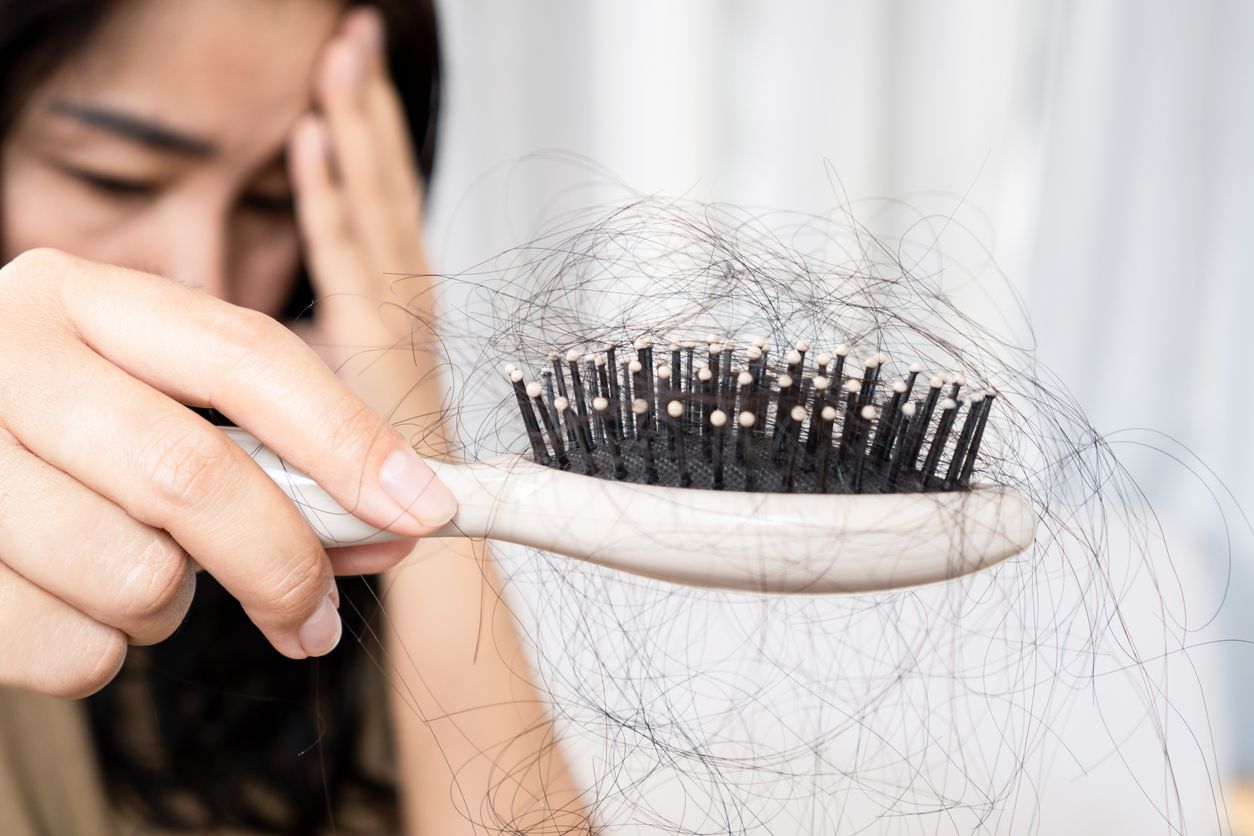
- Home
- Trend
- Weight Loss Strategies
- Acne Tips
- Hair Health Information
- Blemish Removal Tips
- Acne Scar Removal Tips
- Muscle Building Techniques
- Intimate Care Tips
- Postpartum Intimate Care
- Eye Bags Wiki
- Tips for Face Slimming
- Secret of Permanent Hair Removal
- Breast Enlargement Tips
- Cure to Snoring
- Marionette Lines
- Skin-Tightening Secrets
Sudden hair shedding caught me completely off guard! Many of us have experienced this stressful issue—especially nowadays, when hair loss has become increasingly common for both men and women. Whether it's external factors or internal hormonal changes, a variety of causes can trigger or worsen hair loss, sometimes even leading to baldness! In this post, we’ll walk you through the most comprehensive list of hair loss causes, the common signs to watch for, and effective treatment methods—so you can relieve hair loss anxiety and promote healthy regrowth from the root up!
Why Am I Suddenly Losing So Much Hair? 7 Common Causes of Female Hair Loss

Cause 1: Genetics
The most common culprit behind female hair loss is genetic, especially androgenetic alopecia (aka male-pattern baldness). Contrary to popular belief, this doesn’t just affect men—women can inherit the same hair loss genes and experience thinning or balding in multiple areas, especially around the hairline and crown during middle age or menopause.
Cause 2: Hormonal Imbalances
Hormonal fluctuations are another major cause of female hair loss. When androgen levels significantly exceed estrogen levels, it can lead to scalp sensitivity to dihydrotestosterone (DHT), which shrinks hair follicles and increases hair shedding. This is often seen in postpartum or menopausal hair loss. However, even high stress levels can disrupt hormone balance and slow hair growth.
Cause 3: Unstable Scalp Condition
Healthy hair relies on a healthy scalp, which—just like your facial skin—needs a balanced oil and moisture level. If your scalp produces too much sebum, it can clog hair follicles and disrupt normal metabolism, accelerating hair loss.
Cause 4: Poor Nutrition
If you frequently eat out or are on a restrictive diet, beware! Overeating or undereating can both lead to nutritional deficiencies that affect hair health. A lack of protein, minerals, and vitamins prevents hair follicles from getting the nutrients they need to grow strong hair strands.
Cause 5: Irregular Lifestyle
Late nights and poor sleep habits interfere with your hair’s natural growth cycle, shortening the time your follicles can stay in their active phase. Stress-induced hair loss can also result from poor sleep quality. An imbalanced body clock may lead to hormonal disruptions and missed windows of optimal metabolism—affecting hair growth and quality.
Cause 6: Excessive Hair Styling
Frequent dyeing, perming, heat styling, or tight hairstyles can damage both your scalp and hair roots. The tugging and chemical exposure can weaken hair strands and even halt hair production.
Cause 7: Medical Conditions or Medications
Though less common, certain medical conditions and medications can cause hair loss as a side effect. These include thyroid disorders, lupus, polycystic ovary syndrome (PCOS), and chemotherapy—conditions that interfere with normal bodily functions.
4 Common Signs of Female Hair Loss — It’s Not Just About Split Ends

1. Increased Hair Shedding
Finding more hair than usual on your pillow, shower drain, or floor? This could mean your hair shedding has crossed into abnormal territory. A healthy scalp sheds about 50–100 hairs a day—anything more might indicate active hair loss.
2. Receding Hairline
One clear sign your hair has entered the resting phase is a receding hairline, where your forehead begins to look visibly larger than before.
3. Thinning at the Crown
Hair loss doesn't just affect the front—it can also affect the crown, causing what people call bald spots. Women often notice a widening hair part, while men may experience a more classic “bald spot.”
4. Scalp Issues
An unhealthy scalp isn’t just about excess oil—it can also show signs like dandruff or acne-like bumps. These may indicate your scalp isn't getting the nutrients it needs and should be addressed before it worsens.
免費體驗
F8 Hair Regrowth Treatment
1 Minute Self-Registration
Date should not be before minimal date
5 Daily Habits to Improve Female Hair Loss — Must-Know Self-Help Tips!
Habit 1: Prioritize Scalp Care
Improving hair loss starts with improving scalp health! A well-nourished scalp is key to growing healthy hair. Daily scalp massages—either with your fingers or a brush—can help improve circulation. While shampooing, massage gently with your fingertips (not nails), and consider applying hair tonics or growth serums post-wash to nourish problem areas.
Habit 2: Proper Hair Washing Techniques
Women—especially those with long hair—should find the right hair care routine. Choose shampoos and conditioners suited to your hair and scalp type. Go for gentle, natural, and non-irritating formulas. Keep washing frequency in check—overwashing or underwashing can upset your scalp’s balance. For oily scalps, occasional scalp exfoliation is recommended to clear out built-up sebum and unclog follicles.
Habit 3: Eat Hair-Friendly Foods
Your diet plays a major role in hair health. Avoid greasy, processed foods and instead consume nutrients that promote strong hair growth. Key examples include collagen, protein, biotin, vitamins, and minerals.
Habit 4: Manage Stress Levels
Stress management is essential for hair growth and overall well-being. Try calming activities like exercise or hobbies to balance your mood and prevent hormone disruption. Good mental health supports better sleep and scalp metabolism—key for growing thicker, healthier hair.
Habit 5: Cut Back on Styling and Tension
Tension-related hair loss (from tight hairstyles, hats, or excessive styling) is a leading cause of female hair thinning. Let your scalp and strands relax—reducing external stress on your hair can significantly lower your risk of hair loss.
Advanced Solutions for Hair Loss — These Treatments Can Help Regrow Your Hair
1. Professional Diagnosis
If you’re unsure which growth stage your follicles are in, seeing a dermatologist is the fastest way to find out. Since your scalp is part of your skin, a professional can use advanced tools to assess follicle health and provide targeted solutions.
2. Topical or Oral Medication
For faster results, ask your doctor about hair growth medications. These are potent treatments and should only be used under supervision. Popular options include Minoxidil and Finasteride—research to see which is better suited for you.
3. Hair Transplant Surgery
Hair transplants are a more traditional method where active follicles from the back of the scalp are relocated to thinning areas. This restores hair at the root and restarts the growth cycle.
4. Non-Invasive Hair Growth Treatments
If you’re not ready for surgery, try hair revitalization therapies! Modern aesthetic clinics offer non-invasive, pain-free laser treatments that boost follicle activity and prevent further shedding while restoring scalp health.
No Need to Panic Over Sudden Hair Loss! Try the Emergency Rescue Plan: Perfect Medical F8 Hair Regrowth Treatment
Feeling anxious about hair falling out all of a sudden? It’s time to take action! We recommend the Perfect Medical F8 Hair Regrowth Treatment, a non-invasive, pain-free solution that reactivates dormant follicles and restarts your hair growth cycle—restoring full, shiny, healthy hair!
This treatment uses patented low-level laser therapy to stimulate regrowth without any side effects. It also restores scalp balance and one session can deliver results equivalent to 10 uses of regular hair tonics!
Perfect for tackling common female hair loss problems like diffuse thinning, receding hairline, telogen effluvium, seborrheic hair loss, postpartum shedding, or stress-induced hair loss. Register now for a free consultation and enjoy:
• Professional Scalp Analysis
• Perfect Medical F8 Hair Regrowth Treatment
A one-stop solution to combat the appearance-related anxiety caused by excessive hair loss!
Try it Now: Perfect Medical F8 Hair Regrowth Treatment免費體驗
F8 Hair Regrowth Treatment
1 Minute Self-Registration
Date should not be before minimal date
FAQ

Should I see a doctor for abnormal hair loss?
Yes—regardless of how mild or severe it seems, it’s best to consult a dermatologist to assess your follicle condition.
What are some products that help prevent hair loss?
Daily care products like shampoo, conditioner, and hair tonics all fall under anti-hair loss care.
Which illnesses can cause excessive hair loss?
Hormonal imbalances, immune disorders, and certain cancers can all lead to abnormal shedding.
Does everyone experience hair loss?
Not necessarily. With a healthy lifestyle and good habits, hair loss can often be avoided.
What should I eat to reduce hair loss?
Focus on protein-rich foods—red meat, poultry, and fish are great options.








